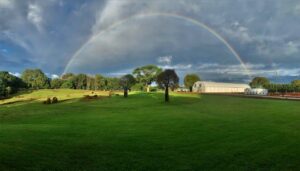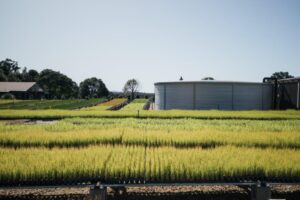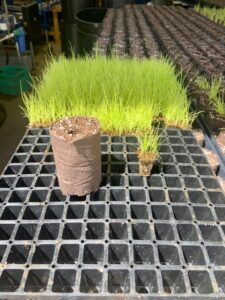
Changing the world one pot at a time
By Gabrielle Stannus
Restoring ecological landscapes is about more than just putting plants into the ground. To improve the sustainability of revegetation itself, we need to consider the full life cycle of our projects, right down to the pots we use to grow and protect our plants.
Pacific Nurseries is one business working to reduce the environmental impacts of revegetation. According to Anthony Micomonaco, Sales & Operations Manager, this wholesale nursery got off to a flying start amidst the COVID-19 pandemic, and now grows around one and a half million plants annually. State of the art facilities mean that two staff can produce between 15 to 18,000 plants in a day; mostly rushes and lower-level grasses such as microlaena, themeda, and imperata, as well as eucalyptus varieties for koalas and Tristaniopsis laurina (water gum). These plants end up in roadside verges, wetland redevelopments, water catchment areas, schools and public parks.
Nestled on twenty acres in Brunswick Heads in the New South Wales Northern Rivers hinterland, the nursery itself is only about an acre in size, with a further nine acres essentially acting as a huge water filtration system. “We capture every drop of water that lands on our nursery and pump it into water tanks. We monitor and filter it and keep it aerated. When we get an overflow, we pump out excess water through a big sprinkler system onto two acres of lawn and then through a series of swales to slow the water as it flows downhill before it is recaptured in a dam. The water is then pumped back to the top of a rainforest where it flows down a waterfall to keep it aerated and clean. We have a water slide in our dam, and we swim in that dam. We catch fish there too. The water is almost crystal clear in that dam,” says Anthony.

Improving its water quality is not the only sustainability-oriented goal that Pacific Nurseries is working towards. This business also wants to reduce the amount of plastic ending up in our landscapes. The horticultural industry is a large user of plastic, mostly in the form of polypropylene (PP) products including pots, labels, stakes, trays, and tubs. Polypropylene is a very useful polymer as it can re-circulated through the packaging value chain with minimal degradation, and it most definitely has its place in a circular economy. However, if not collected and recycled out on the job, this material too can pose an environmental issue.
When it comes to mass plantings and revegetation, there are a lot of these plastic pots potentially floating around our environment. “Going around putting in 40,000 lomandras in plastic tubes, that is 40,000 plastic tubes that somebody must collect and recycle. How can we improve on that experience for landscapers?’ asks Anthony, adding that collecting and returning these pots to recyclers also potentially adds to a project’s costs. Pacific Nurseries’ response to this issue was to purchase a Ellepot machine from PropTech to start producing its own plastic-free, fully compostable pots made from wood fibres. Their Bio-Pots are designed to replace the conventional 75mm forestry tube. Anthony says these pots can be directly planted into the landscape or upsized into larger pot formats.
Anthony claims that these plastic-free, fully compostable pots encourage better vertical and lateral root growth as they enable air pruning of those roots. “That means that when these plants go into the ground for a landscaping job, there is less chance of them being lost through drying wind or excess rain, because they can stabilise more quickly.”

Reducing the defect rate, post-implementation, also improves a landscape project’s sustainability outcomes. “If customers lose five per cent of plants after implementation, that is not a good outcome because it triggers the whole process again; another shipment, more plastic pots, duplicating waste, effort, and cost,” explains Anthony.
Anthony acknowledges that becoming a plastic free nursery is not straightforward given the value this material provides in helping plants to retain water, especially during transportation. At this stage, Pacific Nurseries still uses reusable plastic trays to transport plants. However, Anthony says that they can deliver plants one hundred per cent plastic free: “We can depot them in our nursery so we can reuse those trays. We then put those plants in a fully compostable waxed cardboard box, and we place them on a wooden palette which we then wrap with potato starch pallet wrap and deliver onsite.”
Using biodegradable plant pots and packaging will not save the world overnight, however, it is one small step towards a different future. Whilst you may have to wait for your next budgeted upgrade to install solar panels to make a ‘big’ difference, you can make ‘small’ changes now that will have an environmental impact. As business owners and professionals, we make multiple decisions daily around purchasing and leasing items or choosing where to bank our money or put our super. All these touchpoints are opportunities for you to bring about change at a scale much larger than what you might be able to achieve by yourself.
What will you choose to do next to make our world a better place? What have you already done? I would love to hear from you and share your stories too, like Pacific Nurseries.
Gabrielle Stannus
Inwardout Studio
M: 0400 431 277
E: gabrielle@inwardoutstudio.com
All images supplied by Pacific Nurseries
